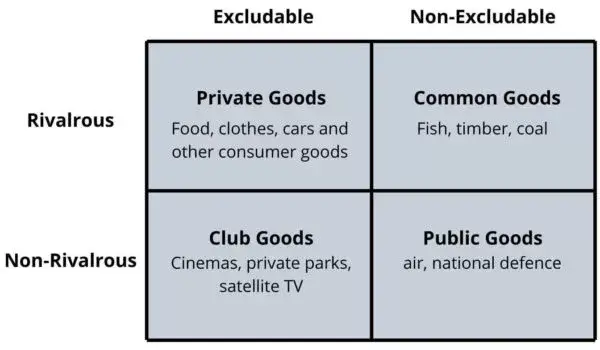Francisco Sant'Anna
Common-Pool Resources
(Previous: Freechains vs the Tragedy of the Commons)

Common-Pool Resources (CPRs) are systems with scarce resources, but at the same time too large to exclude access from outsiders. As a typical example of a CPR, fishing grounds have limited supply of fishes, but easy access to fishers with predatory behavior.
As illustrated in the Figure, CPRs share characteristics of Public and Private Goods: access to resources is non-excludable but rivalrous, i.e., everyone can extract a resource that is scarce.
In her seminal work, Elinor Ostrom proposed eight design principles to manage renewable CPRs and avoid the tragedy of the commons. She noticed that a number of successful CPRs are managed by decentralized communities intead of centralized private and state-owned enterprises.
Internet Forums as Common-Pool Resources
We can think of public internet forums and social media as renewable CPRs: The shared resources here are people’s attention and engagement, which are “extracted” by authors writing to the forums.
In principle, anyone can publish to public forums to get attention. However, the more content there is in a forum, the less reach each post gets individually. People have limited time to consume content, but which renews every day.
In the limit, if the amount of content tends to infinite, then the average attention each post gets tends to zero. This is the tragedy of the commons we want to avoid with the reputation system of Freechains.
Freechains and Ostrom’s Principles
In her book, Ostrom proposes eight design principles to make participants conform with the operation and vigilance of CPRs.
We argue that the reputation and consensus mechanism of Freechains adheres to Ostrom’s principles.
We use a description of the eight principles found here:
-
Commons need to have clearly defined boundaries. In particular, who is entitled to access to what? Unless there’s a specified community of benefit, it becomes a free for all, and that’s not how commons work.
In Freechains, only authors with previous reputation in a specific forum can post there. New participants require welcoming likes from existing participants. Furthermore, posts and their engagements only affect the forums in which they are posted.
-
Rules should fit local circumstances. There is no one-size-fits-all approach to common resource management. Rules should be dictated by local people and local ecological needs.
Each forum has its own informal netiquette, which is defined by and evolves with the community and its published content.
-
Participatory decision-making is vital. People will be more likely to follow the rules if they had a hand in writing them. Involve as many people as possible in decision-making.
A forum netiquette is the result of a history of posts from participants, along with their feedback with likes and dislikes over the time. There is nothing external to user-generated content in the forums.
-
Commons must be monitored. Communities need a way of checking that people are keeping them. Commons don’t run on good will, but on accountability.
All content remains publicly available in the forums and any abusive behavior can be detected by members. Furthermore, the reputation of each member can be consulted at any time.
-
Sanctions for those who abuse the commons should be graduated. Commons that worked best didn’t just ban people who broke the rules. That tended to create resentment. Instead, they had systems of warnings and fines, as well as informal reputational consequences in the community.
Dislikes serve as warnings that gradually reduce the reputation of abusive posts and their authors. If the number of dislikes crosses a threshold, a post can be revoked and its author banned from the forum.
-
Conflict resolution should be easily accessible. When issues come up, resolving them should be informal, cheap and straightforward. That means that anyone can take their problems for mediation, and nobody is shut out. Problems are solved rather than ignoring them because nobody wants to pay legal fees.
Forums are open to discussion and maintain a persistent and transparent archive. Likes and dislikes provide instant feedback to mediate conflict.
-
Commons need the right to organise. Your commons rules won’t count for anything if a higher local authority doesn’t recognise them as legitimate.
Freechains is an open protocol working on top of the Internet infrastructure.
-
Commons work best when nested within larger networks. Some things can be managed locally, but some might need wider regional cooperation.
Given the open nature of the protocol, public forums can be externally monitored and are still subject to law enforcement regarding illegal content.
Ostrom concludes that long-enduring CPRs rely on the correlation between these design principles:
When CPR participants design their own operational rules (principle 3) to be enforced by individuals who are local participants or are accountable to them (principle 4), using graduated sanctions (principle 5) that define who has rights to withdraw units front the CPR (principle 1) and that effectively restrict appropriation activities, given local conditions (principle 2), the commitment and monitoring problem are solved in an interrelated manner.
- Do you see public forums as common-pool resources?
- Is Freechains conformant with Ostrom’s eight principles?
Comment on  @_fsantanna.
@_fsantanna.